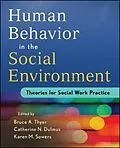An accessible and engaging guide to the study of human
behavior in the social environment, covering every major
theoretical approach
Providing an overview of the major human behavioral theories
used to guide social work practice with individuals, families,
small groups, and organizations, Human Behavior in the Social
Environment examines a different theoretical approach in each
chapter--from its historical and conceptual origins to its
relevance to social work and clinical applications.
Each chapter draws on a theoretical approach to foster
understanding of normative individual human development and the
etiology of dysfunctional behavior, as well as to provide guidance
in the application of social work intervention.
Edited by a team of scholars, Human Behavior in the Social
Environment addresses the Council on Social Work Education's
required competencies for accreditation (EPAS) and explores:
* Respondent Learning theory
* Operant Learning theory
* Cognitive-Behavioral theory
* Attachment theory
* Psychosocial theory
* Person-Centered theory
* Genetic theory
* Ecosystems theory
* Small Group theory
* Family Systems theory
* Organizational theory
Autorentext
BRUCE A. THYER, PhD, LCSW, is Professor and former dean, College of Social Work, at Florida State University. He is the founding and current editor of the bimonthly journal Research on Social Work Practice.
CATHERINE N. DULMUS, PhD, is Professor, Associate Dean for Research, and Director of the Buffalo Center for Social Research in the School of Social Work at the University at Buffalo, SUNY, and Research Director at Hillside Family of Agencies in Rochester, New York.
KAREN M. SOWERS, PhD, is Dean and Beaman Professor in the College of Social Work at the University of Tennessee, Knoxville. Her research interests include juvenile justice, sexuality, social work education, child welfare, evidence–based practice, and international social work practice.
Klappentext
An accessible and engaging guide to the study of human behavior in the social environment, covering every major theoretical approach
Providing an overview of the major human behavioral theories used to guide social work practice with individuals, families, small groups, and organizations, Human Behavior in the Social Environment examines a different theoretical approach in each chapter—from its historical and conceptual origins to its relevance to social work and clinical applications.
Each chapter draws on a theoretical approach to foster understanding of normative individual human development and the etiology of dysfunctional behavior, as well as to provide guidance in the application of social work intervention.
Edited by a team of scholars, Human Behavior in the Social Environment addresses the Council on Social Work Education's required competencies for accreditation (EPAS) and explores:
- Respondent Learning theory
- Operant Learning theory
- Cognitive-Behavioral theory
- Attachment theory
- Psychosocial theory
- Person-Centered theory
- Genetic theory
- Ecosystems theory
- Small Group theory
- Family Systems theory
- Organizational theory
Inhalt
Preface xiii
Acknowledgments xxix
About the Editors xxxi
Contributors xxxiii
Chapter 1 Human Behavior and the Social Environment: Exploring Conceptual Foundations 1
Susan I. Stone, Yolanda Anyon, Stephanie Berzin, Sarah Taylor, and Michael J. Austin
Scholarly and Professional Dilemmas Related to Human Behavior and the Social Environment 2
Development of the Human Behavior and Social Environment Construct 7
A Selection of Frameworks That Address Linkages Between Human Behavior and the Social Environment 14
Life Course Approach: An Application 17
The Social Environment: Key Concepts 28
Frameworks for Linking Knowledge to Practice 36
Conclusion 38
Key Terms 39
Review Questions for Critical Thinking 39
Online Resources 40
References 41
Chapter 2 Respondent Learning Theory 47
Bruce A. Thyer
Respondent Learning Processes 49
Naturally Occurring Examples of Respondent Learning in Real Life 56
Experimental Examples of Respondent Learning 59
Examples of Respondent Learning of Psychosocial Problems 62
Using Respondent Learning in Social Work Practice 67
Creating Conditioned Reactions 69
Philosophical Foundations of Respondent Learning 71
Key Terms 74
Review Questions for Critical Thinking 75
Online Resources 75
References 75
Chapter 3 Operant Learning Theory 83
Stephen E. Wong
Historical and Conceptual Origins 83
Basic Theoretical Principles 85
Advanced Theoretical Principles 96
Recent Theoretical Developments 98
Relevance to Social Work Practice 103
Critiques of the Operant Learning Approach 111
Key Terms 112
Review Questions for Critical Thinking 112
Online Resources 113
References 114
Chapter 4 Cognitive-Behavioral Theory 125
Paula S. Nurius and Rebecca J. Macy
Relevance to Contemporary Practitioners 125
Overview of Cognitive-Behavioral Theory 126
Historical and Conceptual Origins 128
Basic Theoretical Principles 132
Advanced Theoretical Principles 140
Recent Theoretical Developments 144
Relevance to Social Work Practice 146
Evidence-Based Foundations 154
Critiques of This Approach 155
Key Terms 157
Review Questions for Critical Thinking 157
Online Resources 158
References 159
Chapter 5 Attachment Theory 165
Michelle Mohr Carney and Phen M. Young
Historical and Conceptual Origins 166
Basic Theoretical Principles 168
Advanced Theoretical Principles 169
Recent Theoretical Developments 171
Relevance to Social Work Practice 173
Critiques of This Approach 182
Key Terms 183
Review Questions for Critical Thinking 183
Online Resources 184
References 184
Chapter 6 Psychosocial Theory 193
Roberta R. Greene
Developmental Theory 193
Historical and Conceptual Origins 194
Basic Theoretical Principles 197
Advanced Theoretical Principles 207
Recent Theoretical Developments 210
Relevance to Social Work Practice 212
Evidence-Based Foundations: Erikson on Erikson 214
Critiques of This Approach 215
Key Terms 219
Review Questions for Critical Thinking 219
Online Resources 220
References 220
Chapter 7 Person-Centered Theory 225
Michael J. Holosko, Jeffrey Skinner, and Catherine A. Patterson
Historical and Conceptual Origins 226
Basic Theoretical Principles 233
Advanced Theoretical Principles 239<...
